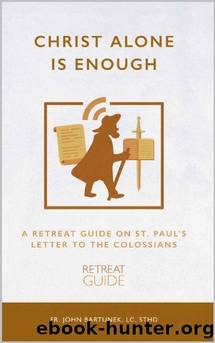Christ Alone is Enough by John Bartunek

Author:John Bartunek [Bartunek, John]
Language: eng
Format: epub
ISBN: 9781793808677
Publisher: Unknown
Published: 2019-01-17T05:00:00+00:00
CONFERENCE Lectio Divina: Letting the Word of Christ Dwell in Us Richly
INTRODUCTION After warning the Colossians about spiritual worldliness and encouraging them to âwalk in Christ,â St. Paul changes gears a little bit. When warning about worldly vices, he used the verbs like âput to deathâ and âput awayâ. When encouraging Christian virtues he used verbs like âput onâ and âdoâ. As he continues sketching a portrait of what it means to be ârooted in Christâ and âbuilt upon himâ, he changes his verbs. He writes:
A And let the peace of Christ control your hearts, the peace into which you were also called in one body. And be thankful. Let the word of Christ dwell in you richly, as in all wisdom you teach and admonish one another, singing psalms, hymns, and spiritual songs with gratitude in your hearts to God.
âColossians 3:15â16 Notice how in each of those verses St. Paul admonishes us to âletâ something happen: âlet the peace of Christ control your hearts,â he writes, and âlet the word of Christ dwell in you richlyâ.
When people knock on our door, we have the option of keeping them out or letting them in. Keeping them out means doing nothing. It means continuing business as usual in the house. Letting them in means deciding to open the door, giving them permission to enter our personal space. This is what St. Paul is getting at here. We need to give Jesus permission to âcontrol our heartsâ with his peace, and to âdwell in us richlyâ through his word. In this conference, we will look at a spiritual discipline used by Christians for centuries to open the doors of our hearts and minds to Christâs life-giving peace and redeeming word. Itâs called Lectio Divina, which is Latin for âdivineâ or âsacred reading.â
ANCIENT ORIGINS The term has a long history. It first appears in written form in St. Benedictâs Rule for monks, written in the early sixth century. Rule #48 begins like this:
A Idleness is the enemy of the soul. Therefore, the brothers should have specified periods for manual labor as well as for prayerful reading [lectione divina].
In this way, prayerful reading of the Bible and of trustworthy commentaries on the Bible became a regular practice among monks and those who were educated by monks.
At first, this Lectio Divina didnât have any particular method. It simply consisted in a slow, prayerful reading of the Sacred Scriptures. It could involve a certain amount of study, but the core of the devotion consisted in a reverential listening in the heart to the inspired Word of God. This form of reading was meant to be a prayer in which the follower of Christ could encounter the person of Christ through the sacred words of the Bible.
In the earliest centuries of Christianity, the Bible was already considered a unique book, a book written by human authors but inspired by the Holy Spirit. The Letter to the Hebrews describes this point of view with a memorable image:
A Indeed,
Download
This site does not store any files on its server. We only index and link to content provided by other sites. Please contact the content providers to delete copyright contents if any and email us, we'll remove relevant links or contents immediately.
God's Word by Ratzinger Joseph Cardinal(213)
Newman on Doctrinal Corruption by Matthew Levering(179)
Jordan Peterson, God, and Christianity: The Search for a Meaningful Life by Christopher Kaczor & Matthew Petrusek(178)
THE LOVE OF ETERNAL WISDOM by Bean(175)
The Good Enough Catholic by Paul Wilkes(167)
The Flame of Love of the Immaculate Heart of Mary - The Spiritual Diary by Elizabeth Kindelmann(165)
The Living Flame Of Love by The Living Flame of Love(163)
Answer Me This! by Patrick Madrid(159)
Jesuits Telling Jokes by Nikolaas Sintobin(159)
Eternity in the Midst of Time by Wilfrid Stinissen(156)
The Pilgrim's Tale by Aleksei Pentkovsky(151)
A Catholic Consciousness by Johnson Luke Timothy;(151)
Manual for Men by Reverend Thomas J. Olmsted(143)
Beyond Sunday by Teresa Tomeo(136)
Against the heresies. Vol. 1 : Book 1 by Irenaeus(135)
First Holy Communion : A Parent's Preparation by Mark Allen(132)
Deep Human by Unknown(125)
On Illustrious Men by Thomas P. Halton; Saint Jerome; Saint Jerome(124)
Three Days: the Search for the Boy Messiah by Chris Stepien(122)
